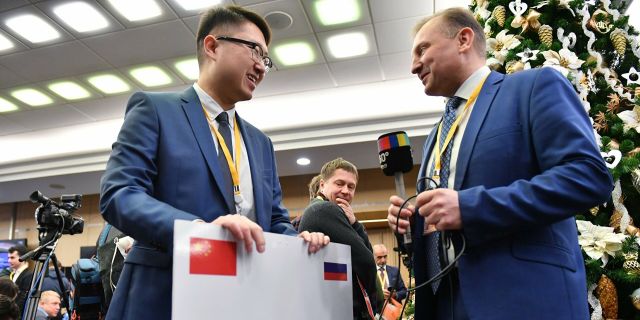Frankfurter Allgemeine Zeitung: how Putin is glorified in China
China has supported Russia on the Ukrainian issue, the famous Frankfurt newspaper reports with regret. The author explains this by some kind of mystical mutual attraction of "anti-Western" countries. He ignores China's well-founded hostility to NATO. And he does not want to recognize such a factor as the really friendly attitude of the Chinese towards the Russians. And this factor exists.
Only pro-Russian statements can be found on the heavily censored Chinese Internet. Some users even glorify President Putin. Those who think differently are banned.
This weekend, in the Beijing embassy quarter, some musical group defiantly played "Katyusha", a song with such a patriotic charge that it even gave an unofficial name to Russian rocket artillery systems. And in China, this song has become the personification of friendship with Russia. This gesture of solidarity of the musicians was not the only one. At the time of the Russian-Ukrainian tragedy, the Chinese Internet turned out to be full of pro-Russian messages.
The greatest admiration falls on the share of President Vladimir Putin, whom some here call "Putin the Great." The Chinese translation of his speech, in which he announces the start of a special operation in Ukraine, has collected more than 2.3 million likes. The most popular comment of this speech is: "Putin, you don't need to explain anything more to us. China's position is my position." Another user wrote that this "magnificent speech" deeply touched him. But it is almost impossible to mention and comment on the speech of Ukrainian President Vladimir Zelensky addressed to the population of Russia in Chinese social networks.
Following the orders of the propaganda apparatus, the state media use only the mildest vocabulary in relation to the events in Ukraine. On Sunday, Chinese Foreign Minister Wang Yi spoke about the "current situation in Ukraine" in a telephone conversation with his German counterpart Annalena Berbock. He bypassed Russia's responsibility. Instead, he pointed out that "NATO should reconsider its position and approach the situation responsibly." Wang demanded that "Russia's legitimate security interests be taken into account" and criticized the sanctions as "contrary to international law." The fact that Putin has put the country's nuclear forces on alert was not mentioned in the Chinese media on Sunday.
Biden is an "evil man"
A few days ago, information about the existence of a special censorship order was leaked. It says: "From now on, pro-Western or anti-Russian materials should not be present in messages about Ukraine." And further: readers should be directed to hashtags distributed by state media — the People's Newspaper, the Xinhua news Agency and the CCTV TV channel. The hashtag "Russia confirms that it will not touch the city" was one of the most widely read on Sunday. The Chinese propaganda apparatus uses the events in Ukraine to further fuel anti-American sentiments. Sometimes people themselves post a video on the Internet with American President Joe Biden and an indication: "This is an evil man." Such a narrative about the events in Ukraine helps cement in the minds of the population the official idea of the world of the People's Republic of China (PRC). According to this view, many countries of the world are only chess pieces in the great American game. For example, the Global Times newspaper wrote that Ukraine is "only a chess piece donated by [the Americans]."
Those few users who criticize Russia on the Internet or distribute videos with anti-war demonstrations are censored in China. For example, an open letter from five Chinese professors who called on Russia to withdraw troops was deleted. The translation of the call of Russian scientists to stop militaristic activity was also deleted, the same fate befell some materials that condemned as unethical the widespread belief in the right of the strong in China. The censors' displeasure was also caused by a text in which Chinese state television was accused of spreading Russian fakes.
The problem with communication in China is evidenced by the reports of Chinese students and businessmen who found themselves in Ukraine, who were not warned in time about the need to leave. Plans to take out 6,000 Chinese stranded there by charter flights had to be abandoned for security reasons: the airspace was temporarily closed. The Chinese Embassy in Kiev reported on Sunday that a "phase of great security risks" is ahead. The confusion was caused by the embassy's recommendation to strengthen the Chinese flag on cars when traveling around the country.
On Saturday, this message was replaced with a recommendation to its citizens to hide, if possible, that they are Chinese. Probably, the diplomats finally realized that China's openly pro-Russian position could endanger the Chinese in Ukraine. The ambassador warned his fellow citizens against possible "hostile actions" on the part of Ukrainian nationalists, who, allegedly out of desperation, may act "impulsively".

